The future is here. It’s bright. And it’s terrifying. That’s what these authors seem to think, anyway. As we’ve sleepwalked through the second year of the pandemic, lucid dreaming our way through endless possibilities in the midst of endless isolation, these authors have sought to capture the highs and lows, perils and opportunities, of a changing world. Get ready for clones, underwater high-rises, alternate histories, eco-terrorists, and of course, murders in space, all speaking to the inherent instability of identity and morality in the fraught future and rapidly disintegrating present.
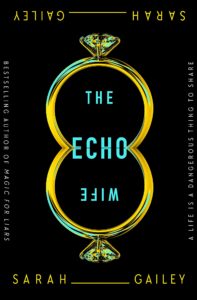
Sarah Gailey, The Echo Wife
(Tor)
In The Echo Wife, a scientist renowned for her skills in cloning finds out that her husband has been cheating on her—with her clone. When the clone kills the husband, the scientist has to cover it up, or else the investigation might ruin her reputation and cause the community to question the efficacy of her research. She’s also got a certain level of sympathy for her genetic twin; her husband’s clumsy attempt to grow the perfect wife hobbled his creation and made her miserable. Innumerable plot twists ensue, leading to a perfect set-piece of an ending.
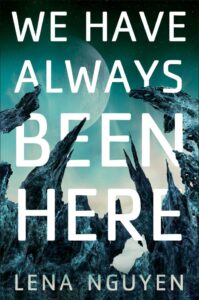
Lena Nguyen, We Have Always Been Here
(DAW Books)
Dr. Grace Park has always felt closer to androids than other humans. Raised by a caring android and benevolently neglected by her father, she leaps at the chance to leave her sealed climate bubble city on Earth and head to space for a mission of exploration. Park is on board to care for the few other human crew members, but a bizarre series of events causes her to shift allegiances to the far more numerous androids on board, as they seek to understand their destination’s awful, awe-inspiring secrets.
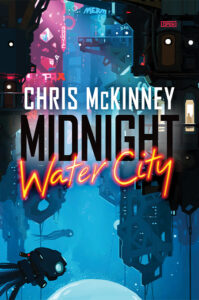
Chris McKinney, Midnight, Water City
(Soho)
Chris McKinney takes the future underwater in this Hawaiian noir, where the rich live in deep “seascapers” while the poor still dwell on the blighted surface in floating slums. In the year 2142, the world is at peace, having narrowly averted a catastrophe when a scientist destroyed an asteroid before it could destroy the earth. Now, that scientist is dead, and her former lover and bodyguard seizes one last chance at relevance by working to solve her murder, no matter who stands in his way. Delightfully creative and with plenty of realistic touches of the futuristic banal, Chris McKinney’s underwater noir is a startlingly original read.
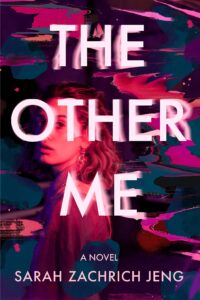
Sarah Zachrich Jeng, The Other Me
(Berkley)
Kelly’s celebrating her birthday at her bestie’s art show in Chicago, living her best life, when she heads to the bathroom and instead walks through the door into a nightmarish version of her own life, one in which she never went to art school and is happily married to a former high school classmate she barely remembers. What happened to her perfect life? And how did she get trapped in someone else’s fantasy? The Other Me works as both a suspenseful psychological thriller and an astute reinvention of the time travel narrative.

Caitlin Starling, The Death of Jane Lawrence
(St Martin’s)
This one reads like a David Cronenberg-directed vision of Victorian London. Magician doctors perform dangerous experiments, rebellious undercurrents threaten an uneasy peace, and the scars of war still cover the land, decades after the country’s fall to invaders. Hard-headed heroine Jane, orphaned and in need of a good marriage, proposes a practical solution to handsome but haunted surgeon Augustine Lawrence: they shall wed, and she will work as his bookkeeper; a business arrangement, eschewing all intimacy, that shall allow Jane to keep her independence and the doctor to keep his secrets. He accepts, on one condition: she can never spend the night in his ancestral home, Lindridge Hall. As love grows between the newly wedded couple, so, too, does curiosity in Jane.

Lincoln Michel, The Body Scout
(Orbit)
In Lincoln Michel’s tongue-in-cheek vision of the future, baseball teams are sponsored by genetic engineering companies and pump their players full of chemicals. Kobo, a former pro-player and now a scout for the Yankees, is deeply in debt after a lifetime of medical upgrades. When his brother, a star slugger for the Monsanto Mets, dies at the diamond in a spectacularly bloody manner, and Kobo gets fired from his scouting gig, the CEO of the Mets gives Kobo a chance to solve his brother’s murder and have his medical debt cleared. But the story behind the the slugger’s death is far more complicated than just a simple murder…The Body Scout will have you cheering for the Monsanto Mets even as you despair for the future.

S. B. Divya, Machinehood
(Gallery/Saga Press)
In 2095, murders are few and far between, but the struggle is real when it comes to competing against AI in a gig-economy. Laborers avail themselves of any upgrades possible as the marketplace for human workers becomes ever narrower, and most require daily pills to fend off new diseases and keep their brains working at peak capacity. Things start to turn crime-y when a mysterious group known as “the Machinehood” begins attacking pill suppliers and making their own case for a new era of machine/human hybrids. This one’s a perfect double-feature with Midnight, Water City (that is, if you, like me, are a fan of grizzled bodyguards cynically dismissing futuristic tech).

Jeff VanderMeer, Hummingbird, Salamander
(MCD)
Jeff VanderMeer’s Hummingbird, Salamander is not only one of the best reviewed speculative fiction novels of the year, but one of the best reviewed books, full stop. In this shifting ecological thriller, a body builder scientist receives a dead hummingbird in the mail, the first stop along a series of increasingly bizarre incidents that indicate the operation of a vast conspiracy bent on destruction of nature itself. A powerful message doesn’t detract from the novel’s highly entertaining action sequences and pop culture mania (not for nothing has this one been compared to Pynchon).
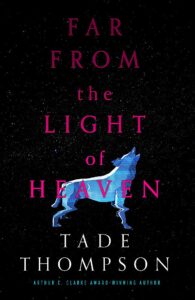
Tade Thompson, Far From The Light of Heaven
(Orbit)
Tade Thompson, known for the Rosewater trilogy and The Murders of Molly Southbourne, is quite possibly the most creative science fiction author around today, and Far From the Light of Heaven cements his reputation for stunning insights into the future and the human mind. In the distant future, a colonization ship docks in the Lagos sector, but some of the sleepers on board never awake, and an outside investigator is called in to find out what—or who—can be deemed responsible for the deaths.

Alison Stine, Trashlands
(MIRA)
Trashlands is part apocalyptic clifi, part hard-scrabble rural noir, and all heart. Coral, her partner Trillium, and her adoptive father Dr. Fall, all live in the junkyard known as “Trashlands,” named for the strip club whose glowing neon sign brings men from miles away to spend their hard-earned plastic. Coral makes art out of history’s remnants, Trillium tattoos memories onto his customers’ skin, and Dr. Fall uses a decades-old set of Encyclopedia Britannica volumes to teach the junkyard’s children of the world before. Plastic is currency in Scrappalachia, where the survivors of climate change barely scrape by, dredging scraps from the rivers to recycle into building materials. Their lives are bleak and brutal, and age is marked by what technological wonders can be remembered from childhood that no longer exist. And yet, the people of Scrappalachia make art, they make families, they make homes, and they make deals. They care for each other, and they refuse to give up the will to survive. Trashlands feels like a fairly accurate depiction of our future, and of the love that we’ll need to make it through the horrors to come.




















